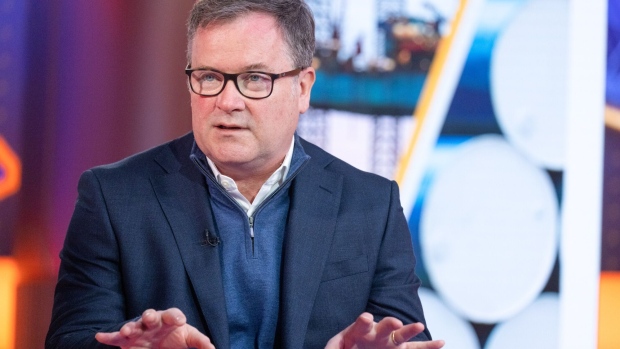Jul 21, 2023
Vitol Urged UK Government to Intervene in Energy Market Crisis
, Bloomberg News

(Bloomberg) -- Commodity giant Vitol Group urged the UK government to add liquidity to the country’s strained energy markets last year in an effort to ease a crisis that threatened to spill into the broader economy.
Executives from Vitol, which made a record profit of almost $15 billion last year, met with then-Chancellor Kwasi Kwarteng and top Treasury officials including Tom Scholar in September, minutes from the meeting show. Trades in power and gas markets were drying up because available funds were locked up as collateral to protect against soaring prices.
Chief Executive Officer Russell Hardy “raised the idea that government intervention could support liquidity in the market” by “effectively incentivising sellers to return to the market” to help stabilize prices, according to the minutes, obtained by Bloomberg News under the Freedom of Information Act. He was joined by former UK minister Alan Duncan, who moved to Vitol after leaving politics.
“Vitol’s sole purpose was to assist policymaker understanding of unprecedented disruption and dislocation in Europe’s energy markets,” a company spokesperson said by email. “It is incorrect to state or imply that Vitol ‘lobbied’ for government action which would specifically benefit Vitol.”
The UK and European Union faced an energy supply squeeze as Russia curtailed gas flows in the fallout of its war in Ukraine, sending power and gas costs soaring. This volatility increased the amount of money companies needed for energy trades, exacerbating the impact of high prices. Governments across the region stepped in to help prop up utilities in order to limit the ripple effects.
Three days after the Sept. 5 meeting, then-Prime Minister Liz Truss announced a £40 billion ($51.5 billion) liquidity fund for traders, called the Energy Markets Financing Scheme, backed by the Treasury and Bank of England. The fund wasn’t open to commodity trading houses like Vitol and ended up with no applicants as prices eased.
“In line with the actions of other countries, a scheme was created as a backstop to ensure energy firms could continue to operate and manage risk, helping to reduce the eventual cost for businesses and consumers,” a Treasury spokesperson said. Firms were able to secure credit lines from commercial banks without needing government-backed support.
Market Stress
Still, the meetings highlight the pressure on the government during the height of the energy crisis. Vitol, one of the world’s most deep-pocketed companies, owns a fleet of gas-fired power plants in the UK. The discussions also underscore the stress faced by traders as prices soared and exchanges demanded extra collateral to support future sales they’d already locked in.
Hardy argued that “wholesale energy markets are not currently functioning in the ordinary efficient manner,” according to the minutes. “Prevailing prices might not fairly reflect the underlying reality of supply and demand.”
Read More: Vitol Posts Record Profit of Almost $15 Billion on Energy Crisis
In a second meeting with Kwarteng, on Sept. 21, attendees also discussed the situations facing the UK, France and Germany during the winter. Hardy raised the risk of financial instability from traders closing positions due to margin calls. The chancellor told Hardy that he wanted to provide reassurance to the market, the minutes said.
In winter, Vitol used controversial tactics to charge a record price for a power plant to keep running when the UK’s grid operator struggled to keep the lights on. The company’s Rye House power station contributed to £525 million in extra costs faced by consumers, a Bloomberg investigation revealed in March. UK energy regulator Ofgem is preparing to limit such tactics.
©2023 Bloomberg L.P.








